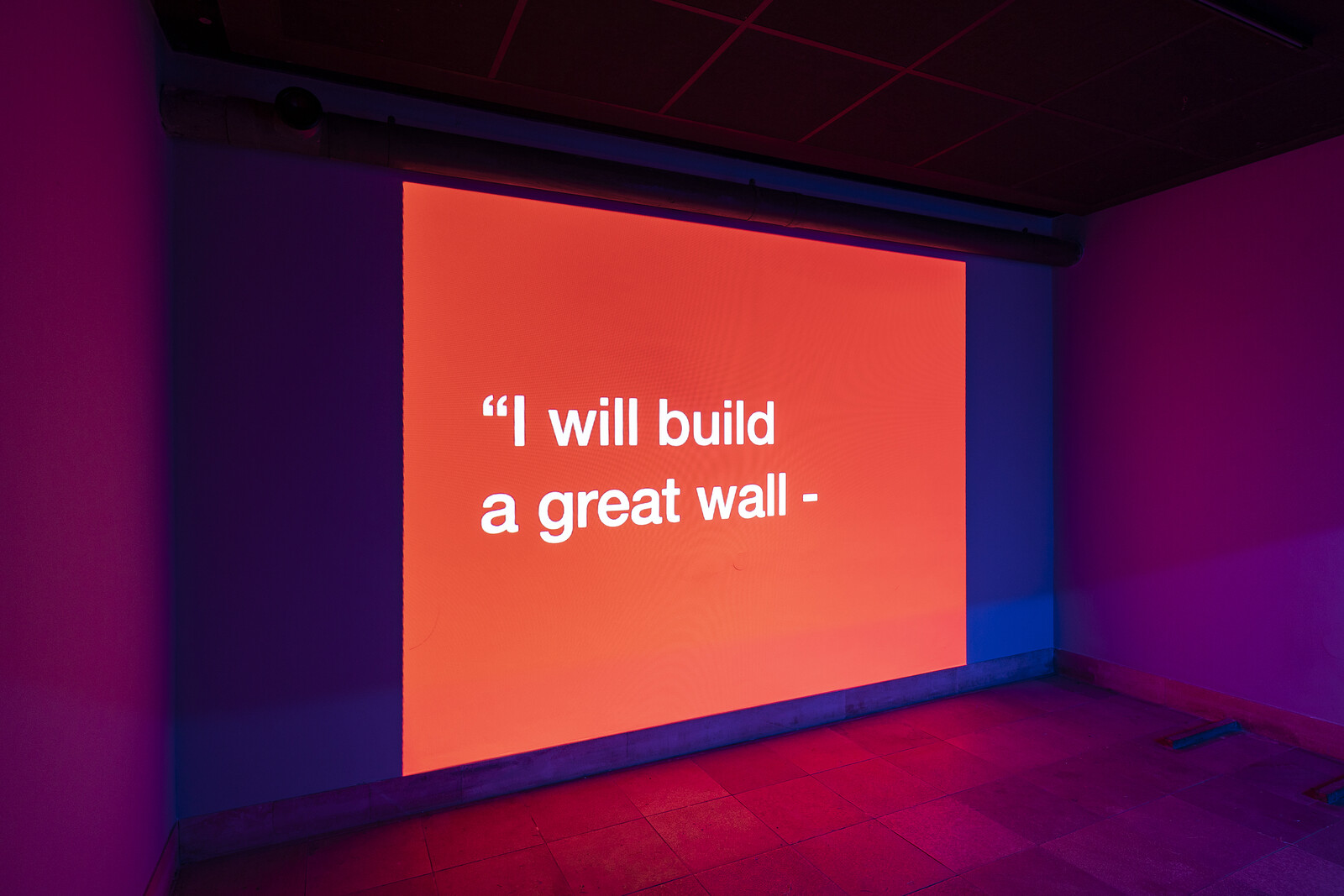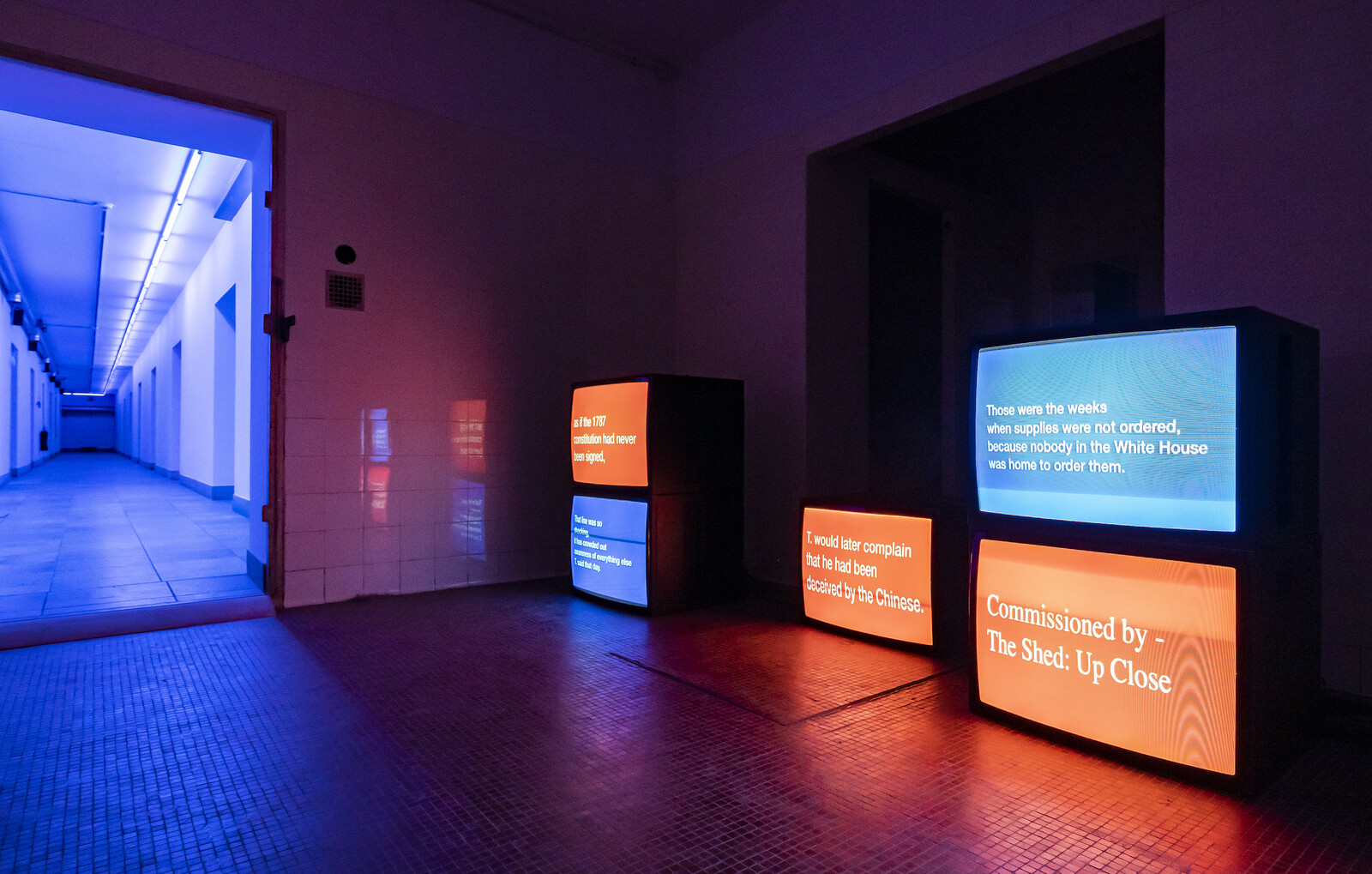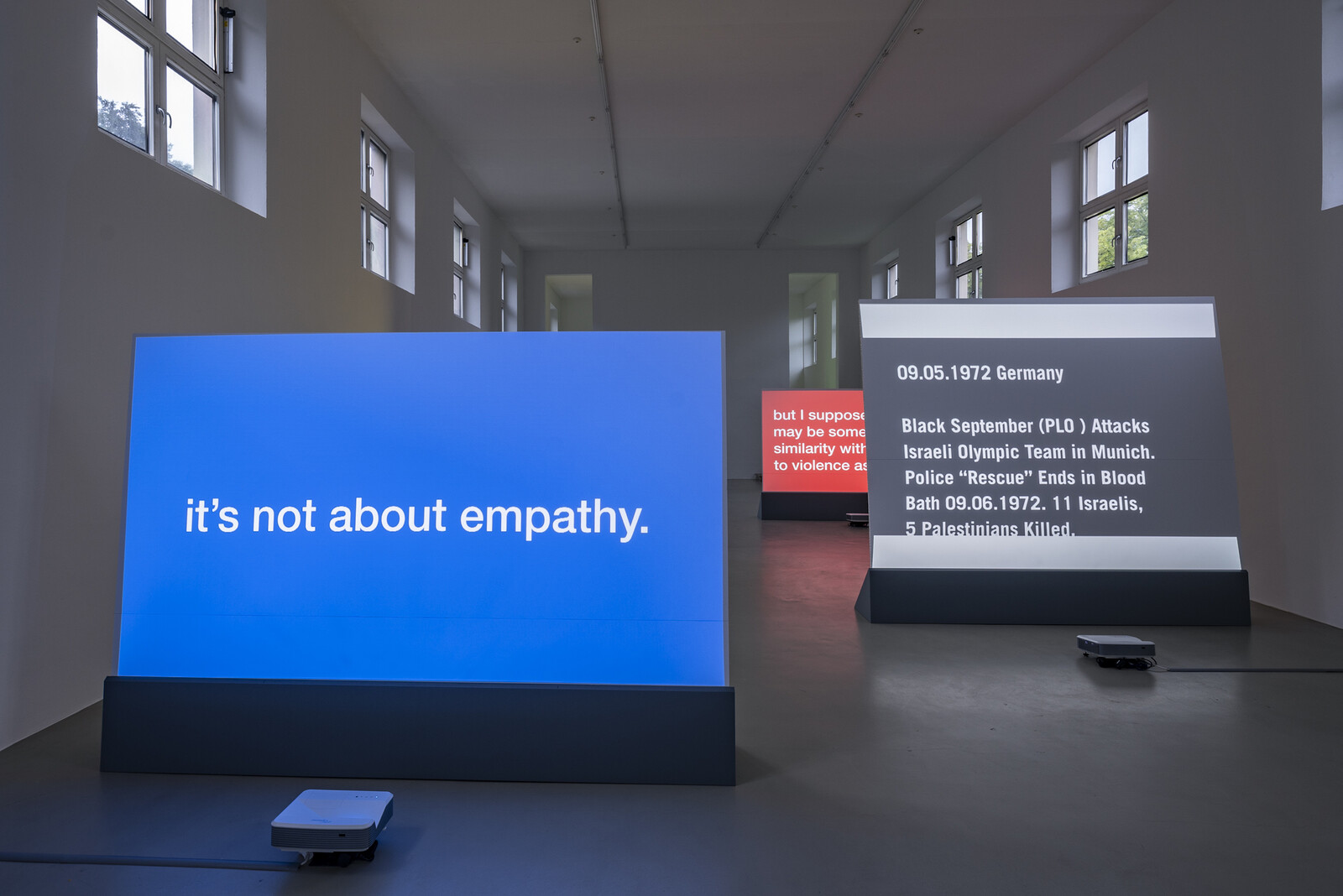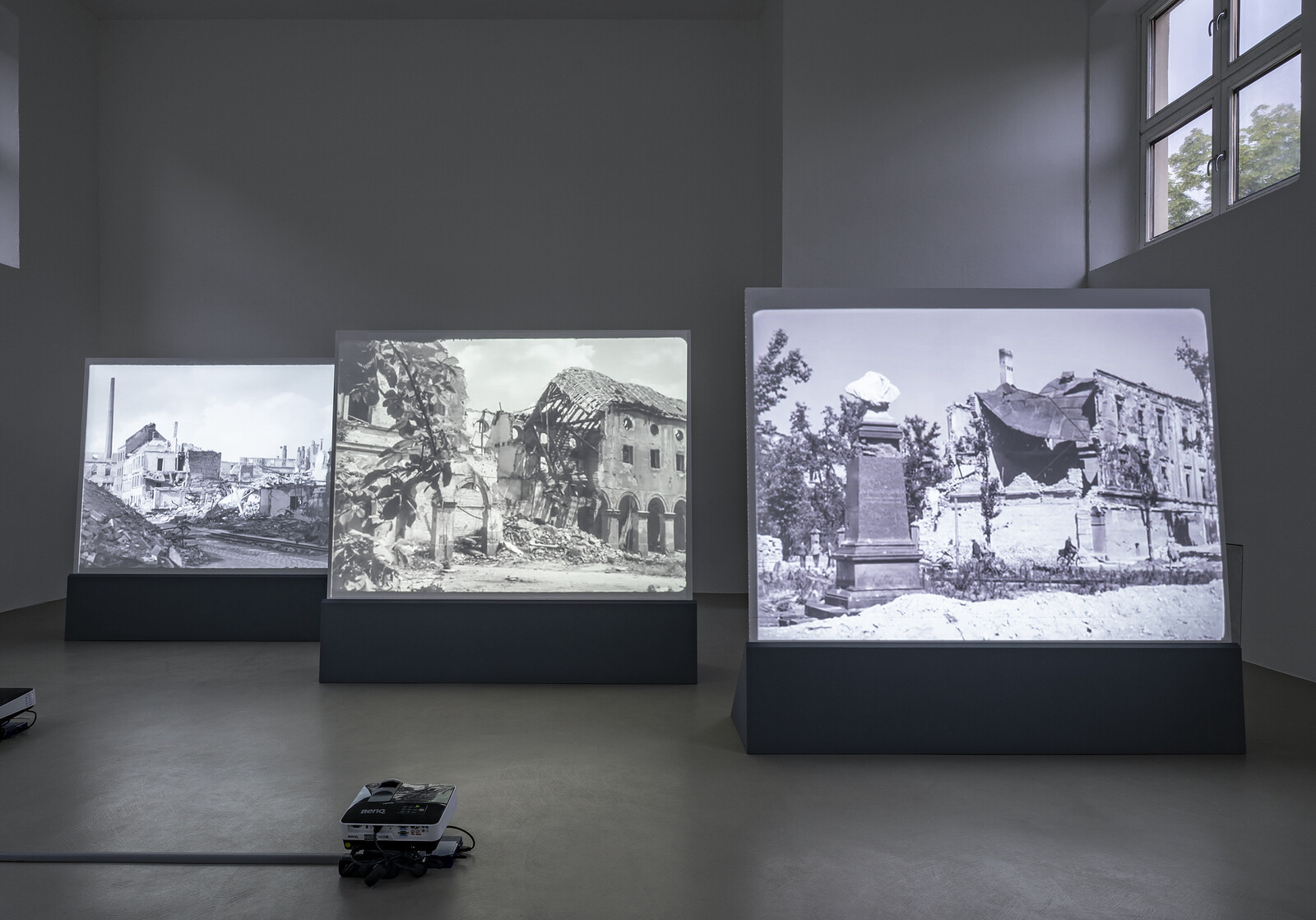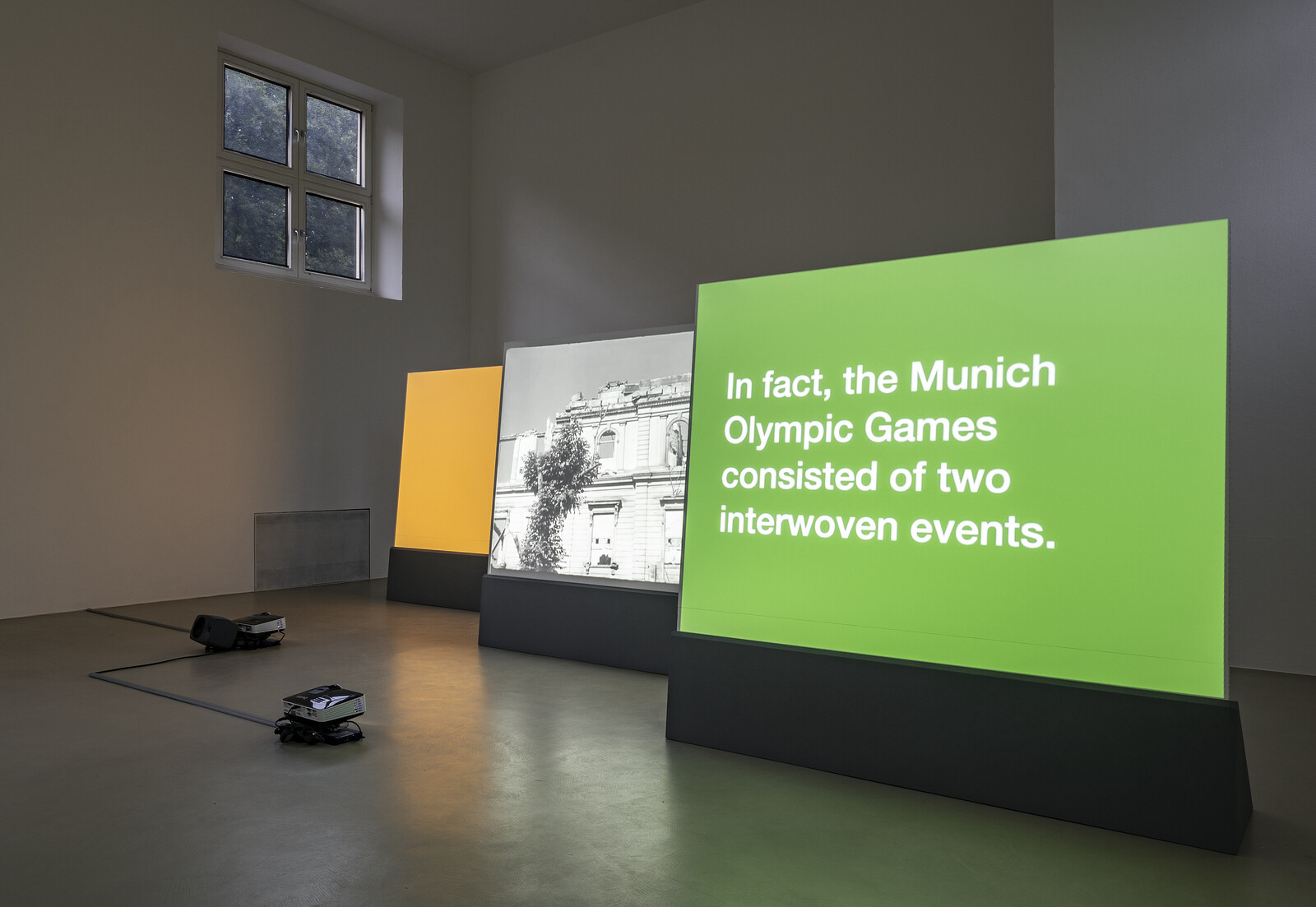June 6, 2022
Walking into “Fragments, or just Moments” at Haus der Kunst is like walking into a club. Blue lighting animates the subterranean LSK Gallery, while atmospheric techno—the audio of Tony Cokes’s Some Munich Moments 1937–1972 (2022)—thuds in the corridor. The effect is uncanny, not least as the bunker was formerly an air raid shelter created by the National Socialist party—as three shower cubicles by the entrance, among other eerie details, testify.
In this retrospective, which spans this venue, the Kunstverein München, and two public sites, Cokes stages a haunting conversation with Munich’s past. 1937 is the year that the Haus der Kunst, designed by Hitler’s “master builder” Paul Troost, opened its doors. In 1972, the city’s Olympic Games, which West Germany hoped would repair its international standing, were overshadowed by the murder of eleven Israeli athletes by affiliates of the Black September Organization, a Palestinian militant group. In the postwar years, Germany undertook a determined program of de-Nazification, and today is reckoning with its colonialism.
In a change of tune from Cokes’s celebrated text animations of the last two decades, which mostly shun representational imagery, Some Munich Moments (different edits of which appear at each venue) features scenes of a comprehensively blitzed Munich. Filmed by artist and postwar politician Willi Cronauer—who was arrested four times by the Nazis for dissent—after United States troops marched into the city in 1945, this footage is interwoven with texts that address design (the pastel graphics of the 1972 Olympics, created by Otl Aicher, explicitly negated the fascist colors and insignia of the 1936 Olympic Games in Berlin), the archives of the commissioning institutions, and—in a disquieting turn—the oratory of Adolf Hitler and fellow artist and Nazi politician Adolf Ziegler.
Twenty-one further videos from Cokes’s back catalogue, dating from 1988 to the present, demonstrate his eclectic citational practice. “This isn’t theory,” avers the three-minute-long 3# (2001), which is accompanied by a jaunty recreation of an early Kraftwerk tune by Seth Price and is on view at Haus der Kunst. “This is history.” Here, artworks are arranged chronologically—albeit not by the date that they were made, but by the decade they address, suggesting that what is at stake is, in fact, a theory of history. At the Kunstverein, which notably hosted the infamous “Degenerate Art” show in 1937, videos beam onto angled honeycomb board. Its lightness is apt for the heaviness of the subjects at hand.
Like modernist critics such as Walter Benjamin or Édouard Glissant, Cokes, an astute reader as well as music aficionado, traces discrepancies to convey the complexity of a bigger picture. Benjamin, who fled the Third Reich in 1933, saw ruins as “allegories of thinking itself,” a notion brought to mind by Cronauer’s contemplative shots of Munich’s pounded streets.1 The shattered shells of civic institutions, like the neo-baroque Justizpalast, are reminders that rubble connotes the prospect of rebuilding.
The artist’s meditations upon blackness add to this narrative. The engrossing Mikrohaus, or the black atlantic? (2006–08) dwells upon musical appropriation through the lens of Paul Gilroy’s writing on hybridity and the dispersal of cultural forms. Evil.80.Empathy? (2020), meanwhile, considers complicity. In it, Tina Campt, in conversation with Saidiya Hartman about the spring 2020 uprisings in the US, states: “I don’t think what we’re experiencing in this protest is empathy. […] It’s about ‘I bear responsibility for this.’”
In his study of the period of Reconstruction that followed the American Civil War, W. E. B. Du Bois writes that the restoration of democracy after the abolition of slavery was never realized.2 Is Cokes’s survey drawing an implicit connection between this heritage and that of postwar Germany? On the one hand, the artist models an ethics of responsibility rooted in an attention to place, and its unassimilable qualities. Yet at the same time, his interest in techno—a genre innovated by Black musicians in Detroit who were inspired by, among other acts, Kraftwerk, that has become associated with unified Germany—points to complex currents of circulation. Ever the synthesizer, Cokes chronicles history fragmenting under the burden of its own weight.
Walter Benjamin, The Origin of German Tragic Drama (London: NLB, 1977), 177–178.
W. E. B. Du Bois, Black Reconstruction in America 1860–1880 (New York: Free Press, 1998), 708.

